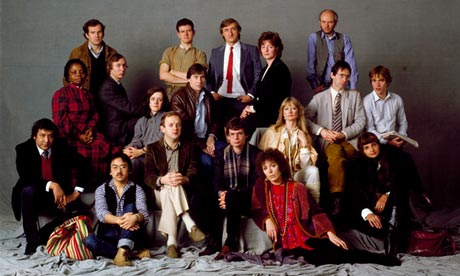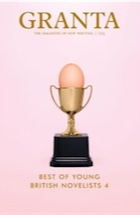Howls of outrage are bound to accompany next month's unveiling of Granta's list of top 20 young writers. Here a former Granta editor and veteran of the 2003 judging panel reveals how the list takes shape


Granta's first Best of Young British
Novelists list, 1983. back row (l to r): William Boyd, Adam Mars-Jones, Julian
Barnes, Pat Barker, Clive Sinclair. Middle row: Buchi Emecheta, AN Wilson,
Ursula Bentley, Christopher Priest, Maggie Gee, Ian McEwan, Martin Amis. Front
row: Shiva Naipaul, Kazuo Ishiguro, Philip Norman, Graham Swift, Rose Tremain
and Lisa St Aubin de Teran. (Two winners were missing from the photograph: Alan
Judd and Salman Rushdie.) Photograph: Camera Press/Snowdon
Ten years is a long time in the literary game: it can easily take someone
until then to finish writing a decent novel – although that's less and less
likely to wash with contemporary publishers. But a decade is also more than
enough time for a writer's fortunes to change dramatically.
 Take Hilary Mantel. In 2003
she was a highly respected novelist and critic, the author of such
enthusiastically reviewed novels as Eight Months on Ghazzah Street,
The Giant, O'Brien and A Place of Greater Safety, the epic
fictional portrayal of the French revolution published a decade previously that
had probably been her most widely read novel. In the spring of 2003 her
extraordinary memoir, Giving Up the Ghost, came out. But Beyond
Black, her macabre novel of psychic shenanigans in the home counties, was
still two years away; and we would have to wait several more before Wolf
Hall and Bring Up the Bodies would scoop two Man Booker prizes and
transport Mantel to the highest echelons of writerly fame. Ten years ago she was
the very emblem of the seriously talented and audacious female writer who was
somehow rarely mentioned in the same breath as the holy trinity of Amis, Barnes
and McEwan. Now, she cannot express a mildly
contentious view in a literary journal without waking to find an outraged
press pack camped on her front lawn.
Take Hilary Mantel. In 2003
she was a highly respected novelist and critic, the author of such
enthusiastically reviewed novels as Eight Months on Ghazzah Street,
The Giant, O'Brien and A Place of Greater Safety, the epic
fictional portrayal of the French revolution published a decade previously that
had probably been her most widely read novel. In the spring of 2003 her
extraordinary memoir, Giving Up the Ghost, came out. But Beyond
Black, her macabre novel of psychic shenanigans in the home counties, was
still two years away; and we would have to wait several more before Wolf
Hall and Bring Up the Bodies would scoop two Man Booker prizes and
transport Mantel to the highest echelons of writerly fame. Ten years ago she was
the very emblem of the seriously talented and audacious female writer who was
somehow rarely mentioned in the same breath as the holy trinity of Amis, Barnes
and McEwan. Now, she cannot express a mildly
contentious view in a literary journal without waking to find an outraged
press pack camped on her front lawn.
 Take Hilary Mantel. In 2003
she was a highly respected novelist and critic, the author of such
enthusiastically reviewed novels as Eight Months on Ghazzah Street,
The Giant, O'Brien and A Place of Greater Safety, the epic
fictional portrayal of the French revolution published a decade previously that
had probably been her most widely read novel. In the spring of 2003 her
extraordinary memoir, Giving Up the Ghost, came out. But Beyond
Black, her macabre novel of psychic shenanigans in the home counties, was
still two years away; and we would have to wait several more before Wolf
Hall and Bring Up the Bodies would scoop two Man Booker prizes and
transport Mantel to the highest echelons of writerly fame. Ten years ago she was
the very emblem of the seriously talented and audacious female writer who was
somehow rarely mentioned in the same breath as the holy trinity of Amis, Barnes
and McEwan. Now, she cannot express a mildly
contentious view in a literary journal without waking to find an outraged
press pack camped on her front lawn.
Take Hilary Mantel. In 2003
she was a highly respected novelist and critic, the author of such
enthusiastically reviewed novels as Eight Months on Ghazzah Street,
The Giant, O'Brien and A Place of Greater Safety, the epic
fictional portrayal of the French revolution published a decade previously that
had probably been her most widely read novel. In the spring of 2003 her
extraordinary memoir, Giving Up the Ghost, came out. But Beyond
Black, her macabre novel of psychic shenanigans in the home counties, was
still two years away; and we would have to wait several more before Wolf
Hall and Bring Up the Bodies would scoop two Man Booker prizes and
transport Mantel to the highest echelons of writerly fame. Ten years ago she was
the very emblem of the seriously talented and audacious female writer who was
somehow rarely mentioned in the same breath as the holy trinity of Amis, Barnes
and McEwan. Now, she cannot express a mildly
contentious view in a literary journal without waking to find an outraged
press pack camped on her front lawn.
Both scenarios are mad, and
flipsides of the same issue. The pigheaded undervaluing of certain writers and
the overnight obsession with others suggest problems with scale and perspective;
problems that are perhaps related to Jonathan Franzen's
analysis of the trappings that come with mega-successful authorship. The money,
the hype, the limo to the Vogue shoot, he wrote, might once have been
the perks; these days they're supposed to be the prize itself. Such baubles are,
he regretfully maintained, "the consolation for no longer mattering to the
culture". In the interests of accuracy, I should point out that Franzen has
softened his pessimism a little in subsequent interviews, and one might also
retort that the work obviously does matter; people are surely reading
The Corrections and Wolf Hall and Freedom and
Bring Up the Bodies, not simply waiting for Franzen to appear on
Letterman or Mantel on Loose Women. But he has a point. When,
these days, a writer becomes well known, when they are successful, when they are
said to have "broken through", what does that actually mean?
No comments:
Post a Comment